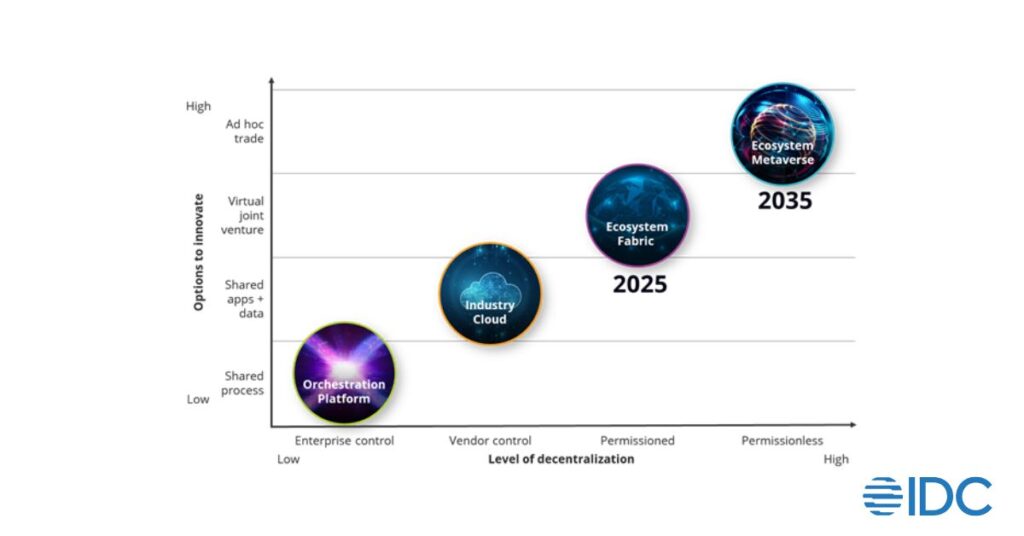IDC defines Web3 as a collection of open technologies and protocols supporting the trustless use and storage of decentralized data, knowledge, and value. Content is decentralized on DAOs (decentralized autonomous organizations), with control and value retained by users.
Blockchains, NFTs, and smart contracts will play a critical role in establishing immutable transaction, communication, and collaboration that is seamless and does not have to be validated every time. Without needing validation it becomes “trustless”. This decentralized, interconnected foundation for industry ecosystems can also serve as the enabling force of the metaverse which is a collection of 3D virtual assets, content, knowledge, and places where people can communicate, collaborate, and transact.
We think as industry ecosystems evolve to include a varied set of partners, customers, suppliers, service providers, and public entities, that Web3 will be leveraged as a complement to classic enterprise business networks. This evolution will provide new sources of data, innovation, applications, and expertise.
Our 2022 Future of Industry Ecosystems Global Survey (July 2022) and Future Enterprise Resiliency Survey (FERS, October 2022) shows that although interest in Web3, as well as DAOs and Metaverse, is strong, IT investments have not followed suit. While it is still the early, experimental days, organizations see how Web3 can provide a foundation that can assure trust, enable innovation, and, perhaps most importantly, scale and/or enhance activity as needed.
How can the Metaverse fit into an Enterprise and Ecosystem Strategy?
Metaverse has been a hot topic over the past year, and although the initial buzz has faded a bit, the question remains: how beneficial can this be for enterprises? We think the answer is very, if implemented in a complementary way across domains and processes in the organization. Experimentation with the metaverse is now predominantly driven by B2C companies such as retailers and banks that are looking for new ways to engage with existing and new customers. As one CEO of a digital bank said: “Metaverse technology, while still evolving, could also fundamentally change the way banks interact with customers and communities”.
The fact is that most organizations are still figuring out the best way to implement it, and many of their experiments will initially fail which is a normal part of the process. But there are many opportunities for every enterprise to incorporate metaverse as a complement to their existing way of working:
- Speeding product development – a place to view, create, and enhance new or existing products in context, through VR and simulation technologies; this could be with internal colleagues, or external ecosystem partners.
- Delivering products and services digitally, wherever the end customer, citizen, consumer, or patient wants – i.e. achieving that ultimate blend of digital and physical experiences.
- Improving ongoing customer engagement and experience and providing another data feed into demand sensing and planning models.
- To the last point, complementing ecommerce opportunities and activities, which many retailers and consumer brands are already exploring.
DAOs as Future Enterprises?
Decentralized autonomous organizations (DAOs) are token enabled, self-organizing, Web3 communities that are based on distributed ledgers and run with a decentralized protocol, so are not dependent on any one contributor.
Members contribute code, data, knowledge, and IP to enhance the DAO. DAOs, much like industry ecosystems, are driven by missions and solving common problems. They are natural extensions and complements to industry ecosystem strategy. While we do not think DAOs will be future enterprises per se, we do think that DAOs present an opportunity for existing, Web2-centric organizations to complement and enhance their operations.
In our recent 2023 Future of Industry Ecosystems FutureScape, we predicted: By 2028, consortium-based DAOs will be the de facto standard for complex industry ecosystem ventures that involve a combination of process, application, and data sharing for new revenue growth.
Industry ecosystem ventures are complex, typically involving multiple participants, large data models, and shared applications not within the same system. Consortium DAOs can be a unifying, digital place for initiatives, data, and applications. There are already many DAOs in existence today that span finance, healthcare, consumer products, entertainment, and smart cities. Data and knowledge is shared, and applications are created and shared within these environments. Which is exactly what we see happening within industry ecosystems today – DAOs can build off of this evolution by encouraging constant innovation, as well as application, data, and knowledge sharing.

Concluding Thoughts
As organizations share data and insights, processes, applications, and expertise within diverse industry ecosystems that will begin to include participants outside of the core industry, Web3 use cases and related IT investment will evolve. We expect organizations to consider, or reconsider, distributed ledgers, smart contracts, and NFTs, as part of a Web3 strategy that empowers trusted industry ecosystems.
We asked in a recent Future Enterprise Resiliency Survey, what technology is your organization currently using in support of sharing data and insights, shared applications, and shared operations & expertise among your Industry Ecosystem partners? Top answers: cybersecurity, cloud applications/infrastructure, customer data platform (CDP), and IoT. Where did decentralized computing tech fall globally? At the bottom of the list: DAOs (11%), Blockchain (9%), Web3 (9%); Metaverse, based on our 2022 Future of Industry Ecosystems global survey, is also being considered, but not yet invested in extensively.
IT investments for industry ecosystems are still very fundamental at this point. This reflects the early-stage maturity of most organizations, according to our recent 2023 Future of Industry Ecosystems MaturityScape Benchmark survey – report forthcoming. Experiments will continue with Web3 and decentralized computing. Organizations see the value in finding the optimal use cases across industry that complement the current Web2 approach of centralized control of data and applications. We think there are multiple domains, processes, and use cases within organizations in every industry and across their ecosystems that are ripe for this decentralized, complementary approach.




